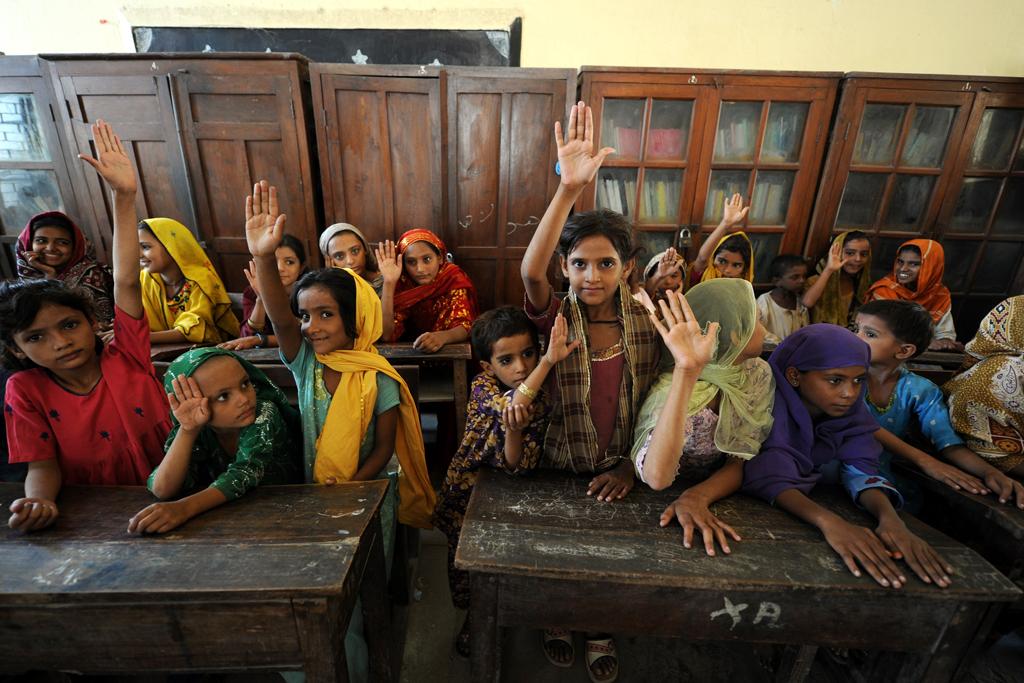Opinion: In defense of Greg Mortenson
Pakistani children raise their hands.
KABUL, Afghanistan — This may come as a big surprise to the dozens of my friends and family members who have heard me rail against “Three Cups of Tea,” but I feel sorry for Greg Mortenson.
The tidal wave of schadenfreude that has greeted his fall from grace is not pretty.
Ever since “60 Minutes” exposed Mortenson’s supposed feet of clay, everyone in the blogosphere, myself included, has been smugly gloating that we were among the chosen few who saw through this self-promoting charlatan. We knew from the beginning that his story was a fake, that his knowledge of the region was razor-thin, and that those schools he purported to have built were far from a rousing success.
But who, exactly, is Greg Mortenson? He is certainly not the author of “Three Cups of Tea” — that particular honor belongs to David Relin, who was composing a morality tale, not compiling a documentary record.
But even through Relin’s laudatory prose, Mortenson comes off as something of a loser. He was a perpetual screw-up, who could not conquer K2, the second highest peak in the world. He couldn’t find his way home, and, once he set his mind to building a school in the Pakistani town of Korphe, took several years to complete a task that should have been completed in a few months.
Mortenson himself acknowledges that his organizational skills leave much to be desired. He cannot manage money, has little head for practical arrangements, and has trouble holding down a steady job.
Perhaps this is what captured the imagination of the millions of enthusiastic readers. If this guy can become a hero, anyone can.
I have to be honest. I hated the book. I hated the sappy writing style, the long drawn-out tale, and, most of all, the central character, Greg Mortenson himself. I just could not understand how anyone could admire a man who was so obviously incompetent. He may have a heart of gold, but a little more organizational savvy would have gone a long way toward advancing his project. I yearned to reach into the pages, shake him, and say “hire a manager, why don’t you?”
Mortenson became the darling of the military establishment, and his advice has been sought on everything from development programs to counterinsurgency. As someone who has lived in Afghanistan for years, I could not fathom why this man, whose involvement in the region was more accidental than voluntary, should become the preferred guru.
I respect the academics who combed through “Three Cups of Tea” for inaccuracies, from the miniscule to the glaring, but I am not among them. I never took the book that seriously. Instead, I think Mortenson’s success, like Britney Spears’, says more about our own cultural paucity than about any duplicity on his part.
Mortenson did not make himself into a hero. If anything, he comes across in the book as a rather bumbling, awkward man who was doomed to failure until he happened to catch the popular imagination at just the right time.
His editors should come in for a share of the blame, if blame there be. An editor exists to prepare manuscripts for publication. The story has to hold together, and it has to be marketable. If a few facts have to be massaged in order to make the overall narrative more readable, then so be it. This is Publishing 101.
I, for one, do not particularly care whether or not Mortenson stumbled into Korphe on his way back from an unsuccessful bid to scale K2, as is depicted in the book, or a year later, as critics now maintain. It was a good yarn, and a certain amount of poetic license is understandable.
More serious are allegations that the “Taliban” who allegedly kidnapped him and held him for several days were actually his guides and protectors. If he has slandered them, then he should be penalized. But for heaven’s sake, how many kidnappers let you take their pictures for their souvenir scrapbook? Didn’t anyone wonder?
The shocking news that the Central Asia Institute may have not done all of the great work that it has laid claim to is no surprise to anyone in the world of non-governmental organizations, where creative report writing is soon to become an Olympic event.
No, the lion’s share of responsibility for this fiasco has to go to the credulity of the public, hungry for a hero, avid for good news from a dark and painful region that continues to consume a disproportionate share of blood and treasure.
“Three Cups of Tea” was inspirational because we needed it to be.
Those who pay Greg Mortenson $30,000 a pop for speaking engagements deserve what they get. If they had read the book, they would know that they were listening to a quasi-fictional embodiment of virtues, a man almost entirely created by publicists.
I am all for truth in advertising, although we’ll probably never get it. But I am also in favor of another ancient principle: buyer beware.
Mortenson’s disgrace, if substantiated, belongs to all of us.
Every day, reporters and producers at The World are hard at work bringing you human-centered news from across the globe. But we can’t do it without you. We need your support to ensure we can continue this work for another year.
Make a gift today, and you’ll help us unlock a matching gift of $67,000!
